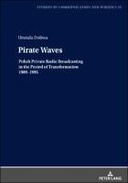Explore

This book reveals the value and significance of pirate radio, with a special focus on local radio stations that broadcast illegally in Poland in the early 90s. It shows that many of them, like in other countries from the region, began as non-commercial, community-oriented initiatives. Several sources of information were used to maximize the potential of the study, especially documents gathered from public institutions, press articles, interviews with radio representatives, and decision-makers who influenced the shape of the broadcasting system. The analysis of these sources supports the conclusion that, although the pirates left a lasting legacy, they lost out in the licensed regime driven by market logic.
This book is included in DOAB.
Why read this book? Have your say.
You must be logged in to comment.
Rights Information
Are you the author or publisher of this work? If so, you can claim it as yours by registering as an Unglue.it rights holder.Downloads
This work has been downloaded 79 times via unglue.it ebook links.
- 79 - pdf (CC BY-NC-ND) at Unglue.it.
Keywords
- 1989–1995
- Bogusława
- broadcast media
- Broadcasting
- community media
- Dobek
- Doliwa
- media in CEE
- media in transition
- media policy
- non-commercial media
- Ostrowska
- Period
- Pirate
- Polish
- Private
- Radio
- thema EDItEUR::J Society and Social Sciences::JH Sociology and anthropology::JHB Sociology
- thema EDItEUR::J Society and Social Sciences::JP Politics and government::JPA Political science and theory
- transformation
- Urszula
- Waves
Links
DOI: 10.3726/b19336Editions

